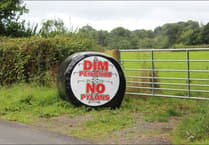65,000 people killed, mainly men, many of them young. You’d be forgiven for thinking I’m writing about the Middle East. But this is the number of British sailors and airmen who gave their lives in the Battle of the Atlantic, during the Second World War. The courage of those sailors prevented Hitler starving us into submission. And it takes real courage to serve below decks in a ship in action.
So after the war, British politicians said “never again”. There was a demand that Britain became self-sufficient. Government agricultural policy incentivised and subsidised food production to try to ensure plentiful, good and cheap food.
When we joined the European Economic Community in the mid 1970s this all came under the Common Agricultural Policy, and so it continued as the EEC morphed into the European Union.
The history of these subsidies is long and complex. Different schemes had their good and bad points. There was plenty of abuse and fraud (right across the EU). They were expensive to administer and swallowed a large amount of EU money (that was our taxes by the way).
Since 2011, agricultural policy has been a devolved matter. That means it is run in Wales from the Senedd in Cardiff. Whilst we were in the EU, the amount of subsidy and the rules and regulations were dictated by Brussels. But now we have left the EU, this is a Welsh Government issue.
Devolved administrations in both Scotland and Wales have become adept at blaming Westminster for everything. But there is nowhere to run and hide on this one. Decisions on the future of Welsh farming and the rural economy are the remit of the Welsh Government and those that sustain them in power. So they need to step up to the plate and take responsibility and get this one right. It’s actually a bit of a litmus test as to whether devolution works.
To date, the signs aren’t good. Like any business, farming craves some certainty. In an uncertain world, that’s not easy to achieve, and in fairness not within the control of the UK leave alone Welsh Government.
But our government can put in the time and effort to understand the science, to remember our history and to set a direction of travel that ensures both food production and care for our environment. Those two aims are most definitely not mutually exclusive, especially here in west Wales.
To date the Welsh Government have continued the Basic Payment Scheme to farmers, although inflation has more than decimated its true value. A new Sustainable Farming Scheme is due to come into force in 2025, but as yet the details are unclear; a likely requirement for farmers to put 10 per cent of their productive land into woodland will destroy the business model of many family farms.
Meanwhile the Glastir (Environmental) scheme comes to an end this year. A badly thought out Habitat Scheme (introduced without notice or proper consultation with the Welsh farming unions) is badly lacking both in resources and sound administration. It is designed to run for one year only. This is a senseless waste of time and bureaucratic cost, when the obvious option would have been to roll Glastir over until the new Sustainable Farming Scheme was up and running. It leaves many family farms facing a financial cliff edge at the start of 2025.
One possibility is that Mark Drakeford’s government simply doesn’t care about Welsh farming and the rural economy and community, or worse, that for selfish political reasons they actually want to undermine them. More likely (I hope) is a profound lack of knowledge, interest and wisdom.
The science of carbon cycling and sequestration and achieving net zero is undoubtedly very complex. We are at an early stage of understanding this.
The Welsh Government have somehow been captured into a crazy groupthink in which tree planting (at the expense of food production) is the only answer.
Good science, a lot of it done here in Wales confirms this is wrong. But the real risk is that Welsh farming and the rural community will be sacrificed on the altar of half-baked nonsense.
And with the world in a more dangerous place than it has been for 60 years, ignoring our food security is insane; the souls of 65,000 dead sailors remind us of that.




